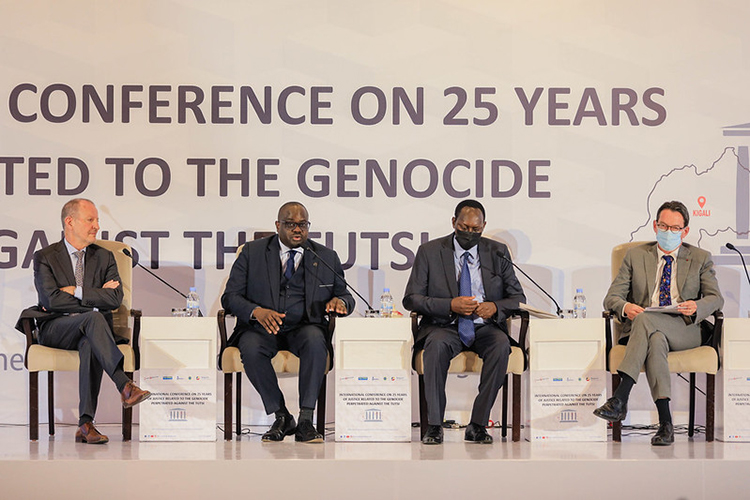
By Alice Kagina, The New Times
The International Criminal Tribunal for Rwanda (ICTR) could have done better to protect and support and offer protection to witnesses in court cases following the 1994 Genocide against Tutsi, experts have said.
This was said during an international conference held in Kigali to discuss the 25-year journey of Rwanda’s justice sector with specific focus on dispensing justice related to Genocide perpetrated against Tutsi.
Among the topics discussed included the legacy of the ICTR, the court instituted by UN to try masterminds of the Genocide against the Tutsi in which over a million people died.
Adama Dieng, former Chief Registrar of the tribunal and disclosed different challenges faced during the court’s tenure spanning over 20 years, saying the international community could have done more to offer long-term support genocide survivors, especially when it comes to offering psychological support.
Delegates follow a presentation during the International Conference on 25 years of Justice related to the Genocide in Kigali on November 17, 2021.
Dieng, who has also previously served as the UN Special Advisor on prevention of Genocide, said there were many lessons that can be drawn from the ICTR in terms of international criminal justice.
The tribunal relied mostly on genocide survivors for testimonies that pinned the suspects, leading to convictions.
Egide Nkuranga, President of IBUKA, the umbrella body of associations that support genocide survivors said that the court could have done better in providing further mental health care to the witnesses.
Me Eric Gillet, President of RCN Justice & Démocratie, Me Julien Kavaruganda , Bert Versmessen Ambassador of the Kingdom of Belgium to Rwanda, Faustin Ntezilyayo Chief Justice of Rwanda during the International Conference on 25 years of Justice related to the Genocide in Kigali on November 17, 2021. Dan Nsengiyumva
“When the Arusha court started, witnesses were not given prior preparation, some did not give full testimonies because of being harassed (by defence) and left traumatized,” he said.
He suggested that the ICTR framework should have considered a follow-up programme for victims, even after court proceedings.
Julien Kavaruganda, the outgoing president of the Rwanda Bar Association said that although the witnesses received no reparations, they were able to testify the atrocities made by Genocide perpetrators and their consequences.
“Reminding people of the crimes committed, and where possible criminals asking forgiveness to the victims, is the responsibility of this court which one can commend,” he added.
Providence Umurungi, Head of International Justice and Judicial Cooperation Department at the Ministry of Justice, said it’s hard to confirm that the outcomes of ICTR judgments have contributed to reconciliation in Rwanda.
“Even when you see those who have already completed their sentences… first of all they didn’t recognize that there was a Genocide, never expressed their remorse… they have now considered themselves as political opponents,” she added.
The ICTR was established in 1995 by the UN Security Council to deliver verdicts against persons responsible for committing Genocide. It was also the first institution to recognize rape as a means of perpetrating genocide.
It was based in Arusha, Tanzania until it was dissolved in December 2015 and its work was taken on by the UN Mechanism for International Criminal Tribunals which is still functional.
Kavuraganda said that since then, the Rwandan judicial system has put in place mechanisms to extradite fugitives from different countries and bring them to justice.
